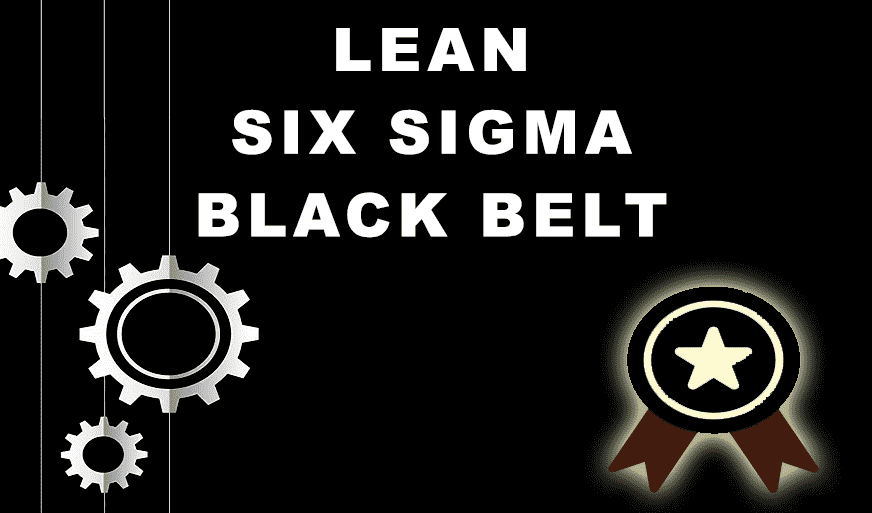Lean Six Sigma on Resume for Rewarding Career Benefits
-
 By Rohini Madhavi
By Rohini Madhavi - Published on Nov 20 2023

Table of Contents
- Does Lean Six Sigma Look Good on a Resume?
- Six Sigma Certification Levels
- Benefits of Having Six Sigma Certification on Resume
- The Five Key Principles of Six Sigma
- How Does Lean Six Sigma Add Value to Your Resume?
- Points of Interest of Six Sigma Certification for Professionals
- Points of Interest of Six Sigma Certification for Organizations
- What are the Career Opportunities for Lean Six Sigma?
- Frequently Asked Questions (FAQs)
- Conclusion
Does Lean Six Sigma Look Good on a Resume?
Obtaining a "Six Sigma Certification" can play a vital role in navigating this transformative landscape. The automated transformation has become the most sizzling famous articulation of this decade. New developments and mechanical assemblies support the transformation outing of associations of every kind imaginable.
Similarly, mechanized transformation fast tracks an association's turn of events. Meanwhile, we must take care of quality control, and this helps the businesses the successful transformation.
Keeping on the head of creating business areas and cycles, the American association Motorola developed another thought of quality organization measure in 1986.
A Six Sigma expert has a sound theory of guidelines and techniques. Therefore, concentrated on business transformation through a portrayed measure. This finished thing is Six Sigma.
What is Six Sigma?
Six Sigma is a ton of the board instruments as well as methods expected to improve business by reducing the screwup likelihood.
An information-driven system uses a simple strategy for taking out deformities. Six Sigma starts from the ringer twist used in experiences.
Six Sigma Certification Levels
The Six Sigma affirmation comes in numerous skill levels that are as follows in the below-given sub-points. These affirmations can be obtained through the American Society for Quality.
Six Sigma White Belt
It is the fundamental degree of confirmation that manages the essential Six Sigma contemplations, as well as White belts, keep up change the board in association and draw in with near to actual thinking social events that help experiences.
Six Sigma Yellow Belt
At this level, you know the points of interest of Six Sigma, and how and where to apply them. You will keep up experience packs on essential thinking assignments.
Six Sigma Green Belt
At this level, you comprehend progressed assessment and can resolve that sway quality. Green belts lead activities and help the professional black belts with data course of action and evaluation.
Six Sigma Black Belt:
Dark belts are stars and issue solvers. Furthermore, they give arranging, notwithstanding driving undertakings.
Six Sigma Master Black Belt
This is the most basic level of Six Sigma accomplishment. At this level, you will shape approach, cause critical assessments, go about as a specialist, and guide the skilled black and green belts.
Popular Six Sigma Certifications
Six Sigma Green Belt Certification
Six Sigma Black Belt Certification
Six Sigma Yellow Belt Certification
Benefits of Having Six Sigma Certification on Resume
Integrating Six Sigma certification into your resume offers a multitude of advantages that extend beyond a mere qualification. Employers highly value the skills and principles instilled through Six Sigma, making it a noteworthy asset in a competitive job market. Let's explore its practical benefits:
- Showcase of Problem-Solving Proficiency:
Possessing Six Sigma certification signifies more than just knowledge; it demonstrates your prowess in systematic problem-solving methodologies. Employers seek candidates who can navigate challenges, analyze data, and implement effective solutions. The inclusion of Six Sigma on your resume is a tangible representation of your ability to lead and contribute to the continuous improvement of processes.
- Commitment to Quality and Excellence:
By featuring Six Sigma certification on your resume, you signal to employers that you not only comprehend the principles of delivering value to customers but prioritize excellence in every facet of your work. This commitment is a valuable trait in roles where precision and quality is vital.
- Versatility across Industries:
One of the notable advantages of Six Sigma is its universal applicability across diverse industries. Including Six Sigma on your resume positions you as a versatile professional capable of applying proven methodologies in various business environments. This versatility is particularly appealing to employers seeking candidates adaptable to different industry settings.
- Differentiation in a Crowded Job Market:
Six Sigma certification provides a distinctive edge, signaling to employers that you possess a unique skill set focused on achieving results and driving continuous improvement. This differentiation can be a decisive factor in securing interviews and standing out among other candidates.
- Contribution to Operational Efficiency:
Six Sigma's primary focus on streamlining processes and eliminating inefficiencies aligns seamlessly with the responsibilities of many roles. By highlighting Six Sigma on your resume, you communicate your proficiency in optimizing processes, reducing waste, and contributing to overall operational excellence, making you an asset to prospective employers.
In summary, having Six Sigma certification on your resume is a strategic move that extends beyond a qualification—it's a testament to your problem-solving proficiency, commitment to quality, and versatility across industries. As you shape your candidate resume, incorporating Six Sigma enhances your professional profile, making you a sought-after candidate in today's dynamic job market
The Five Key Principles of Six Sigma
Six Sigma has its foundations in five essential norms:
Keep your primary center of attention on the customer:
This depends upon the overwhelming perspective that the client is the ruler. The essential objective is to pass on the most significant situation to the client with appropriate solutions.
Measure the opportunities and find your solution for the problem:
Has Six Sigma undeniably portrayed targets for information variety? For instance, they are describing the information to be assembled and clarify the information gathering.
However, encounters expire, ensuring the precision of assessments, and working up a standardized information collection structure.
Learn if the information helps achieve the targets. However, the information ought to be refined or additional information accumulated. Perceive the issue. Posture requests and finds the hidden driver.
Discard the defects of the project
At the point when the issue is perceived, make changes to the cycle to get out of the grouping. Thus, it takes out acquiescence. Discard the exercises in the process that do not add any significance to the client's respect.
On the off chance that the worth stream does not uncover where the problematic distortions, devices are utilized to help find the peculiarities and issue regions as well as smooth out capacities to accomplish quality control and reasonability.
Keep the party going
Fuse all accessories to obtain the best results. Get a formed cycle where your social affair contributes and helps out their moved limit with regards to fundamental thinking.
Six Sigma cycles can altogether impact an alliance, so the get-together should be capable of the standards and procedures utilized.
Moreover, unequivocal arranging and data are needed to decrease the danger of undertaking or reconsidering dissatisfactions. Thus, it guarantees that the cycle acts ideally.
Assurance of a flexible and responsive ecosystem
The exemplification of Six Sigma is a business change and change. The thing should be done when a flawed or wasteful cycle is abstained from; it requires an adjustment in the work practice and worker approach, as well.
A liberal culture of adaptability and responsiveness to changes in process can guarantee smoothed-out undertaking execution.
The people and workplaces included should have the choice to conform to change effortlessly, so to empower this, cycles should be proposed for a smart and steady gathering.
To sum up, the association with an eye fixed on the information investigates the principal concern discontinuously and changes its cycles where the key, can expand a genuine edge.
How Does Lean Six Sigma Add Value to Your Resume?
In this domain of professional world, where a compelling resume can make all the difference, incorporating Lean Six Sigma certification stands out as a strategic move. Let's explore how Lean Six Sigma adds significant value to your resume, making you a sought-after candidate in today's job market.
Demonstration of Problem-Solving Expertise:
Lean Six Sigma certification is a testament to your proficiency in problem-solving methodologies. Employers seek candidates who can navigate challenges, analyze data, and implement effective solutions. By showcasing Lean Six Sigma in resume, you highlight your ability to lead and contribute to the continuous improvement of processes.
Commitment to Quality and Excellence:
Lean Six Sigma is synonymous with a commitment to quality and excellence. Certifying in this methodology signals to employers that you not only understand the principles of delivering value to customers but also prioritize excellence in every aspect of your work. This commitment is a valuable asset in roles where precision and quality control are paramount.
Versatility across Industries:
One of the remarkable advantages of Lean Six Sigma is its applicability across various industries. By having this certification on your resume, you position yourself as a versatile professional capable of applying proven methodologies in diverse settings. This versatility is particularly appealing to employers seeking candidates adaptable to different business environments.
Contribution to Operational Efficiency:
Lean Six Sigma focuses on streamlining processes and eliminating inefficiencies. By highlighting this certification, you signal to prospective employers that you bring a skill set geared toward enhancing operational efficiency. This is especially attractive in roles where optimizing workflows and resource utilization are critical for success.
Leadership and Project Management Skills:
Achieving Lean Six Sigma certification is not just a recognition of knowledge but also an acknowledgment of your leadership and project management skills. It demonstrates your capacity to lead improvement projects, guide teams, and contribute significantly to organizational goals. This is a key selling point for roles that require effective leadership and project execution.
Competitive Edge in the Job Market:
In a crowded job market, setting yourself apart is crucial. Lean Six Sigma certification provides that edge, signaling to employers that you possess a unique skill set focused on achieving results and driving continuous improvement. This competitive advantage can be a decisive factor in securing interviews and landing desirable positions.
Alignment with Modern Organizational Practices:
As organizations increasingly embrace Lean Six Sigma principles, having this certification align your skill set with modern organizational practices. Employers recognize the value of professionals who bring contemporary methodologies to the table, making your resume stand out as a reflection of current industry trends.
To conclude, adding a Lean Six Sigma in resume goes beyond a mere qualification; it's a strategic move to elevate your professional profile. It communicates a dedication to excellence, problem-solving prowess, and a commitment to contributing significantly to organizational success.
As you shape your resume, integrating Lean Six Sigma is a compelling way to demonstrate your value and make a lasting impression on prospective employers.
Points of Interest of Six Sigma Certification for Professionals
Coming up next are the top reasons why you should get six sigma certifications
1) Help your organization in decreasing dangers and deformities
Getting a Six Sigma accreditation and Project Management Software like Celoxis empowers a person to get essential to a connection's capacity to perceive and dispose of messes up. Getting Lean Six Sigma training can help in this aspect.
2) Improve business exercises and quality administration
After you take our six-sigma green belt insistence course, you will have the decision to review an affiliation's gathering and business cycles and make sense of how to improve them. Optimizing your Six Sigma CV with a dedicated verification showcases your expertise in driving efficiency.Top of Form
You will correspondingly have the choice to facilitate a comprehensive survey of current practices and see how they impact quality execution. This is why Lean Six Sigma training is important.
Additionally, insistence shows that you can accomplish the degree of continued quality improvement that affiliations require by watching cycles near guarantee there is zero deviation from the mean and taking accommodating measures to get a task wandering from the way.
3) You will make your profession turn into the modern head
Six Sigma systems are valuable in different enterprises. These incorporate industry pragmatist frameworks like flight, devices, telecom, banking, and budgetary associations, Information Technology, Human Resources, showing, and others.
People avowed in Six Sigma are educated in various systems that can be applied to smooth out business measures, improve specialist confirmation, lessen expenses, and enlargement compensation all of which lead to a common essential concern, paying little psyche to the business.
With a Six Sigma Green Belt Certification, you will have the decision to orchestrate yourself as a change manager inside any alliance. This way, initiating quality improvement throughout your team or organization will strengthen your association's range of abilities, making you more marketable.
Ensure to reflect your six sigma green belt resume to underscore your capacity for driving impactful change for organizational efficiency.
Suggested Course – Lean Six Sigma Green Belt Certification
4) Assurance and consistence to the association
Six Sigma requests inconceivable norms. For this explanation, an actual number of merchants, procurers, and oversight affiliations apply Six Sigma principles while assessing things or records.
Experts with Six Sigma Green Belt Certification can help their relationship in keeping up invaluable understandings and adjusting to broad principles. This is one of the benefits of undergoing Lean Six Sigma training. Highlighting your Six Sigma Green Belt Resume emphasizes your industry prowess.Top of Form
5) Climb to the high-level administrative and strategical positions
Right when you complete your Six Sigma course and get your certification, you will have a way of evaluating and assessing cash-related ideal conditions by executing any Six Sigma experience.
Six Sigma accreditation helps authorities with ensuring hazard assessment and financial association limits.
Suggested Course – Lean Six Sigma Black Belt Certification
6) Improving quality control basics
The Six Sigma arranging measure reviews hands-for deal with industry undertakings and hypothetical standards execution to guaranteed conditions.
Starting a Six Sigma course stimulates your augmentation of perceived experience even before joining the workforce. It certainly proves highly beneficial to undergo Lean Six Sigma training.
Points of Interest of Six Sigma Certification for Organizations
It has the following points:
1) Diminished and reduced costs in operation
Blemish decline limits waste; in this way achieves a little effort of creation and higher advantages as well as Powerlessness to cause a quality thing can be extravagant.
Six Sigma is driving a wretched thing or organization to can, in a general sense, reduce its cost.
2) Helps in building the client's faith and confidence in the company:
Executing six Sigma will provide help with streamlining cycles and help to decrease client dedication. Moreover, this allows to applying the robust cycle arranging framework, Citibank had the alternative to recognize uneconomical steps in their cycles and right them, with exceptional consequences in shopper faithfulness levels.
3) Build reliability among the stakeholders of the company:
Clients and partners trust an organization whose workers hold significant capabilities, as well as Six Sigma professionals, concentrate on quality if financial specialists and accomplices trust an organization that focuses primarily on quality.
What are the Career Opportunities for Lean Six Sigma?
Getting started on the Lean Six Sigma journey not only boosts your skill set but opens doors to a various possibilities of career opportunities. Professionals armed with Lean Six Sigma certification are sought after across multiple industries for their expertise in process optimization, quality control, and data-driven decision-making. The versatility of Lean Six Sigma makes it a pathway to various rewarding career paths.

The career opportunities for Lean Six Sigma professionals are vast and varied. Whether you aspire to lead quality initiatives, manage projects, or drive process improvement, Lean Six Sigma certification equips you with a skill set that is highly sought after in today's competitive job market.
As industries increasingly recognize the value of continuous improvement, the career landscape for Lean Six Sigma professionals continues to expand, offering a wealth of opportunities for those dedicated to excellence and efficiency.
Frequently Asked Questions (FAQs)
How do you write Lean Six Sigma on a resume?
When incorporating Lean Six Sigma on your resume, consider creating a dedicated "Skills" or "Certifications" section. Clearly mention your Lean Six Sigma certification level (e.g., Green Belt, Black Belt) and any specific projects you've led or contributed to using Lean Six Sigma methodologies. For example: "Certified Lean Six Sigma Green Belt with experience in streamlining processes and reducing operational costs."
How do you list Lean on a resume?
If you have expertise in Lean methodologies, showcase it prominently in the "Skills" or "Qualifications" section of your resume. Highlight specific Lean techniques you are proficient in, such as 5S, Kanban, or Value Stream Mapping. For instance: "Demonstrated expertise in Lean principles, including 5S implementation and continuous process improvement."
What is Lean Six Sigma skills?
Lean Six Sigma skills encompass a range of competencies focused on improving operational efficiency and reducing waste. These skills include process mapping, data analysis, root cause analysis, statistical tools usage, and project management. Proficiency in Lean Six Sigma demonstrates an ability to identify opportunities for improvement and implement strategies to enhance overall organizational performance.
What is a Lean job description?
A Lean job description typically outlines roles that involve applying Lean principles to optimize processes and eliminate waste. Positions with a Lean focus may include responsibilities such as streamlining workflows, reducing lead times, and implementing continuous improvement initiatives. Individuals with Lean expertise are often sought after for roles like Lean Specialist, Process Improvement Analyst, or Lean Consultant.
Should I put Six Sigma Yellow Belt on a resume?
Including Six Sigma Yellow Belt certification on your resume can be beneficial, especially if you are early in your Six Sigma journey. Highlight specific skills and knowledge gained during Yellow Belt training, such as process mapping or basic data analysis. While not as advanced as Green or Black Belt certifications, Yellow Belt signifies an understanding of Six Sigma principles, showcasing your commitment to process improvement.
Conclusion
As should be obvious, the significance of the Six Sigma affirmation couldn't be more critical. For individuals, staying competitive and employable in a world with decreasing job opportunities is essential. Enhance your professional profile further by incorporating relevant achievements in your Six Sigma CV, showcasing your commitment to excellence in process improvement.
As a business, you will have genuine feelings of serenity, realizing that experts whose essential center is quality control your creation lines.
If you've gone after a position as of late, you realize how troublesome it tends to be to get similar to handling a meeting. Here and there, you might be facing several different applicants who are on the whole, competing for a similar position.
To get Six Sigma Training and Earn a Six Sigma Certification, chat with our six sigma course expert
Subscribe to our Newsletters
Popular Programs
Trending Posts
Six Sigma Black Belt Certification – Value and Career Benefits in 2024
Last updated on Jul 27 2023
Six Sigma tools for DMAIC Phases
Last updated on Nov 8 2024
Leadership vs Management - The Ultimate Guide
Last updated on May 9 2024
Pareto Chart in Six Sigma - Explained
Last updated on Mar 24 2025
Best Quality Management Tools
Last updated on Oct 8 2024
Service Delivery Manager Interview Questions and Answers (With Examples)
Last updated on Oct 31 2024
Categories
- Agile Management 54
- AI and Machine Learning 42
- Big Data 53
- Business Management 51
- Cloud Computing 44
- Digital Marketing 56
- Information Security 8
- IT Hardware and Networking 17
- IT Security 103
- IT Service Management 29
- Leadership and Management 1
- Microsoft Program 2
- Other 43
- Programming Language 31
- Project Management 162
- Quality Management 75
- Risk Management 8
- Workplace Skill Building 2
Trending Now
Top Career benefits of Lean Six Sigma Green Belt
ArticleLean methodology, Six Sigma methodology and Lean Six Sigma Explained
ArticleSix Sigma Black Belt Certification – Value and Career Benefits in 2024
ArticlePareto Chart in Six Sigma - Explained
ArticleQuality Management Interview Questions 2024
ArticleSix Sigma Certification Guide - A Professional's Guide
ArticleSix Sigma Yellow Belt Certification - Six Sigma for Beginners
ArticleQuality Control Explained – Six Sigma
ArticleTotal Quality Management - A Complete Guide for Beginners
ArticleQuality Assurance in Six Sigma Explained
ArticleQuality Assurance vs Quality Control
ArticleSix Sigma Certification – Everything you Need to Know About Getting Certified
ArticleQuality Manager Interview Questions and Answers for 2025
ebookService Delivery Manager Interview Questions and Answers (With Examples)
ArticleSix Sigma Interview Questions and Answers 2024
ArticleHow to become a Quality Analyst
ArticleA Supply Chain Management Guide to Mastering Logistics End to End
ArticleSenior Quality Manager Interview Questions and Answers 2024
ArticleTop 30 Quality Analyst Interview Questions and Answers 2025
ArticleFinancial Analyst Interview Questions and Answers 2024
ArticleRisk Manager Interview Questions and Answers 2024
ArticleCompliance Manager Interview Questions and Answers 2024
ArticleOperation Manager Interview Questions and Answers
Article5 Lean Continuous Improvement Principles to Supercharge Your Operations
ArticleHow to Become a Quality Manager - Career, Job Scope and Certifications
ArticleEssential Components of a Quality Management System
ArticleSix Sigma Certifications - Reasons Why you Should Get Them
ArticleTop Qualities of a Good Manager and a Leader
ArticleLearn about Statistical Process Control (SPC) and its top applications
ArticleCost of Poor Quality - A Detailed Guide
ArticleImplementing 5S Methodology for Better Work Efficiency
ArticleWhat Is Lean Management?
ArticleBest Six Sigma Books in 2024
ArticleLeadership vs Management - The Ultimate Guide
ArticleQuality Assurance Plan - Six Steps To Quality Assurance Plan
ArticleOperational Planning Creation, Key Elements and its Benefits
ArticleA Complete Guide to Product Life Cycle Stages 2025
ArticleSix Sigma tools for DMAIC Phases
ArticleWhat Is Lean Manufacturing?- An Overview
ArticleThe Lean Continuous Improvement Model: A Comprehensive Guide
ArticleDMAIC vs. DMADV: Key Differences and Choosing the Right Six Sigma Methodology
ArticleA Deep Dive into the Power of Lean Continuous Improvement Process
ArticleLean Continuous Improvement Methods for Business Excellence
ArticleIntroduction to Lean Manufacturing- Definitions, Framework, and More
ArticleUnderstanding the Key Principles of Lean Manufacturing
ArticleSecret to Unlock Organizational Excellence: Stages of Continuous Improvement
ArticleLean Continuous Improvement: A Detailed Guide to Mastering Organizational Quality
ArticleLean Waste Management: The Ultimate Guide 2023
ArticleA Deep Dive into Lean Continuous Improvement Tools
Article8 Wastes of Lean - Strategies for Identification and Elimination
ArticleThe Ultimate Guide to Lean Manufacturing
ArticleUnderstanding Lean Manufacturing's Pros and Cons
ArticleLean Waste Reduction Strategies: Boost Efficiency and Cut Costs
ArticleTop 10 Lean Manufacturing Tools for Optimal Productivity
ArticleBeyond the Basics: Benefits of Lean Continuous Improvement
ArticleWhat are Quality Standards? | A Guide to ISO Standards
Article7 Important Types of Quality Management System
ArticleA Comprehensive Guide to Quality Management Systems
ArticleISO 9001 Standard: Benefits and Certification
ArticleBenefits of QMS Certification for Your Business
ArticleStep-by-Step Implementation Guide to ISO 9001
ArticleThe Ultimate Guide to ISO 9001: Boosting Quality and Certification Success
ArticleQuality Management System – QSM Approaches and Methodologies
ArticleHow to Effectively Implement a Robust Quality Management System?
ArticleExplaining QMS Documentation Structure: Benefits and Best Practices
ArticleWho Needs ISO 9001 Certification and Why?
ArticleKey Elements of ISO 9001:2015 Quality Management System
ArticleOvercoming Common Challenges in ISO 9001 Certification: Tips and Best Practices
ArticleBest Quality Management Tools
ArticleTotal Quality Management (TQM) vs. Six Sigma
ArticleQuality Manager Salary: What Freshers & Experts Earn in 2025
ArticleCertified Scrum Product Owner: Job Roles And Responsibilities
ArticleTips for Continuous Integration Testing: Streamlining QA
Article10 Quality Management Strategies Adopted by Top Managers
Article



















